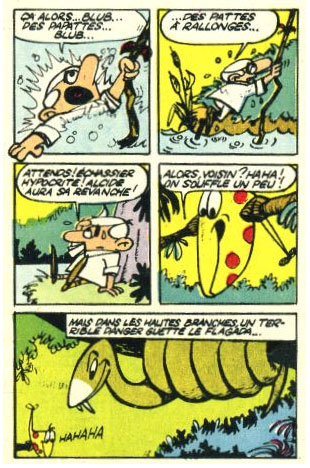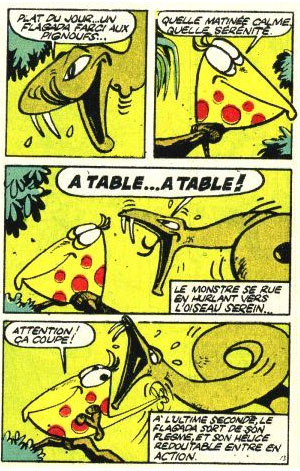Charles Degotte was a Belgian comic and lay-out artist, who enjoyed a long career at Spirou magazine. He is best-known as the creator of the yellow 'Flagada' bird (1961-1993), which originated in the magazine's fold-in mini books section. Another of his long-running series was the hot rod gag comic 'Les Motards' (1984-1993). Degotte was also active as a children's book writer, illustrator and TV animator.
Early life and animation career
Charles Degotte was born in 1933 in Verviers, a town in the Belgian province of Liège. As a child, he already showed a passion for drawing, and in the 27 October 1949 issue of Spirou weekly, his talent was recognized in the magazine's section with drawings and poems sent in by readers. For nine years, Charles Degotte had his first job as a machine tool worker in the Duesberg factory in Verviers. He then studied at the local Art Academy, and found a job as a decorator at the Grand Bazar in Verviers, where he created a mural for the fishmonger's corner.
A regular visitor of this corner was fellow Verviers citizen and comic creator Raymond Macherot. The latter helped him compile a portfolio, which in 1960 led to his employment by publishing house Dupuis. He began his long association with the Marcinelle-based publisher at its animation department TVA Dupuis, where he worked alongside studio chief Eddy Ryssack, director Jean Delire, camera man Raoul Cauvin and fellow artists Vivian Miessen and Michel Matagne, among other people. Degotte served as animator on the first adaptations of Peyo's 'Smurfs' for the Walloon TV channel RTB (nowadays RTBF) (1961), and the more experimental animated shorts 'Teeth is Money' (1962) and 'Le Crocodile Majuscule' (1964). By 1968, he was assigned with the lay-outs of the Dupuis magazine Télé-Moustique, and shortly afterwards that of the comic magazine Spirou as well.
Spirou mini-books
In the early 1960s, when Degotte was mostly active as an animator for publishing company Dupuis, he also appeared in the pages of Spirou with comic stories and illustrations. Like many of the Dupuis staff artists, his stories were initially limited to the special centerfold mini-books, introduced by art director Maurice Rosy and editor-in-chief Yvan Delporte a couple of years earlier. From 1961 on, Degotte made regular contributions to the section, either alone or in cooperation with his studio colleagues. With fellow TVA members Raoul Cauvin, Michel Matagne and Eddy Ryssack he produced the booklets 'Manque de Pot' (1964) and 'Le Gâteau du Roy' (1965) under the joint signature Desquatre (literaly, "The Four"). Among Degotte's own mini-books were several one-shot stories, starring wizards ('L'Enchanteur Désenchanté', 1961), dictators ('¡Viva Patata!', 1961) and movie makers ('Ruée sur le Désert', 1962). However, his very first contribution introduced the character he would become mostly associated with: the Flagada.
'Flagada'.
Flagada
'Prenez Garde au Flagada' was published in Spirou issue #1196 of 16 March 1961. The main hero was Alcide Citrix, a hunter of rare animal species. His prey was the Flagada, a wacky yellow bird that flies by using a propeller on his tail. The bird lives on a tropical, deserted island. His main hobby is relaxing and eating "pignouf", a type of fruit only found on his island. The characters made irregular appearances in sporadic stories, until 1966, when Degotte's publication tempo increased. In these new 'Flagada' stories, Alcide has given up hunting the bird. He prefers to lie in a hammock, enjoying the lush tropical life. Alcide and the Flagada have even become the best of friends, filling their days exploring the island's mysteries or protecting their paradise from outside threats. Alcide, however, still has to counter the bird's anarchic behavior with his logic, while on the other hand the Flagada enjoys ridiculing his human friend with pranks and wacky puns. The cast is later expanded with Professor Trucmuche, who uses the island as a testing ground for his crazy and dangerous inventions, and the lazy and clumsy blue cormorant Émile, who is unable to catch any fish and is lovingly nurtured by the Flagada.
The Flagada's mostly slapstick adventures, filled with burlesque humor and witty wordplay, continued in the mini-books section until 1971. Between 1968 and 1974, Degotte additionally made a series of gags called 'Le Flagada et les Pépins de la Pêche', which centered around the character's attempts at fishing. In 1972, the Flagada made its definitive transition outside of the mini-books into Spirou's regular pages. Until 1983, Alcide, Émile and the Flagada frequently starred in gags, short stories and four longer serials, 'Requin, Flotte et Fantaisie' (1978), 'Émilius le terrible' (1979), 'L'Île de Nivapapapa' (1981) and 'Le Flagada et le Martin–bêcheur' (1982). A new short story was published in Spirou in 1987, and a final gag page in 1988. In the late 1970s, Bom helped Degotte out with his scripts, but in the end the artist preferred working alone.
Despite its run in Spirou's pages of over 25 years, Éditions Dupuis never rewarded the bird with its own album series. This, however, didn't make the character any less emblematic, as the Flagada has remained an icon in Franco-Belgian comics. If not for his own adventures, then for the many tributes made by André Franquin in his 'Gaston' gags. Franquin was a big fan of the character, and often drew the yellow bird as a background joke on walls, pieces of merchandise, and even as a costume for his goofing office clerk in a 'Gaston' gag collected in the album 'Le Géant de la Gaffe'. Interestingly enough, Degotte's Flagada was inspired by Franquin's own goofy, non-existent exotic animal the Marsupilami. In a special retro issue of Spirou magazine (#2300, 1982), the rebellious Yann and Conrad made a parody of Franquin's famous story 'Le Nid des Marsupilamis' (1956), called 'Le Nid des Flagadas', which had Degotte's 'Flagada' in the leading role instead of the Marsupilami. It took until 1981 before Éditions Pepperland issued the first book collection of some of Degotte's early 'Flagada' mini-books stories, followed in 1989 by an album of 'Emilius le Terrible' through M.C. Productions.
'Les Motards'. Dutch-language version.
Les Motards
In 1984, Degotte dropped the Flagada and shifted from the tropics to the city for a new gag series full of slapstick humor and clever wordplay. A motorcyclist himself, the author's new project was a gag series about a good natured biker gang called 'Les Motards' (1984-1993). The large cast consists of anthropomorphic birds, all with their own biking interest or speciality. Olaf, for instance, is the sidecar specialist, who often shows up with absurd creations. Billy the Kick is a DIY genius, and Lafrime the show-off, who rides large American bikes. Spidi is the group's hotrod, while Gamelle spends more time crumpled on the asphalt than on his bike. However, the stand-out character is the naïve Duhon, a large good-natured fellow whose yellow "I LOVE" T-shirts always reflect his mood or thoughts. His ever-changing shirts make him comparable to Richard F. Outcault's 'The Yellow Kid'. Dupuis collected 'Les Motards' in ten books, released between 1986 and 1993. The series also inspired the editorial section 'Essai Motard' (1986-1987), written by Geo Salmon and illustrated by Degotte.
'Pat Rolman, de Sint-Bernard van de Weg', Dutch-language comic strip for the Belgian roadside assistance service. Ran in Touring Wegenhulp in 1986-1987, original(?) French name is unknown (strip discovered by Chris Mouton).
Additional work
In addition to his comic series, Degotte wrote and illustrated several children's booklets in Dupuis' Collection du Carrousel. He wrote and drew three booklets with the hedgehog Bigoudi (1966-1967), the latter two in cooperation with Michel Matagne: 'Bigoudi le Petit Hérisson' (1966), 'Bigoudi, le Hérisson Frisé, et Julie la Taupe qui Voulait Pêcher La Lune' (1967) and 'Le Ballon de Bigoudi' (1967). Together with his wife Lucy Degotte, Degotte contributed the more educational installments 'A.B.C. des Animaux' (1967) and 'J'Apprends à Compter' (1970). Charles Degotte additionally wrote the text for 'Antoine et l' Anneau Magique' (1968, illustrations by Will), 'Grand Coq' (1969, illustrations by Rémy Dubois) and two volumes starring Jean Roba's comic characters 'Boule & Bill': 'Boule et Bill, La Maison Perdue' (1968) and 'Boule et Bill à la Montagne' (1969), both with illustrations by Roba.
Degotte additionally developed the characters 'Les Zippies' for Belgian television, and had his own funny animal cartoon series called 'Zoodingue à Degotte' (1983-1985) in Spirou.
In Spirou/Robbedoes #1772 (30 March 1972), Degotte appeared alongside Émile and the Flagada in a photo comic, made in collaboration with Vivian Miessen and photographer Gérald Frydman.
Death, legacy and influence
Charles Degotte continued to do lay-out work for Spirou until his pre-retirement in the early 1990s. Having suffered from bipolar disorder, the author eventually committed suicide on 20 April 1993. Beloved within both the comics and the biker world, his legacy is far from forgotten. In 1996, Éditions Dargaud posthumously collected several of Degotte's later-day 'Flagada' stories in a volume of their 'Les Classiques de Rire' collection. The small French imprint Le Coffre à BD compiled the complete 'Flagada' run in eight volumes between 2007 and 2011, and then continued with 'Les Motards' in 2011. Comic creators Tome and Janry remembered their old friend in a tribute comic called 'L'Illustre Inconnu', which appeared in Spirou #3852 of 8 February 2012. Philippe Bercovici and Zidrou revived 'Le Flagada' for two new albums published by Glénat in 2008 and 2009. Instead of returning to Degotte's original setting, the new authors decided to create a new narrative about the quest of a young girl and her father who try to find the mythical bird.
Between 8 and 24 February 2024, Galerie Champaka in Brussels hosted a special exposition with original 'Flagada' art under the title 'Le Flagada – Un mythe de la BD!'.
In the introduction to the 1996 Dargaud collection, Degotte's widow Luce explained that to outsiders, her husband appeared as a sociable person, but that he actually preferred the solitude of his atelier, where he devoted his time to the deserted island of his Flagada, while listening to records by French chansonniers and American jazz legends. Charles Degotte was the father of Belgian actor, comedian, screenwriter and director Charlie Degotte (1962), known for his atypical and at times surreal productions and performances.










